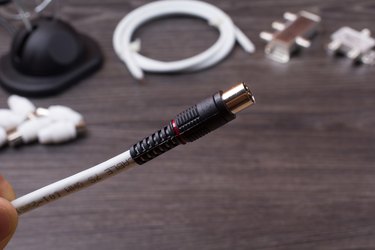
What are Coaxial Cables?
Coaxial cables are essentially just cables made of wire which carry radio or television signals. They are used for carrying television networks from a distributor to individual houses, which is why the service is known as Cable TV. Their distinct thick, round shape is due to a heavy layer of interior insulation which is designed, in part, to reduce the effect of magnetic fields on the signal the cable carries, as well as reduce the amount of signal loss which occurs as signals pass through great lengths of coaxial cable.
Structure
Video of the Day
There are four parts of a coaxial cable. The first is the central wire, which is perfectly round and cylindrical. The second is a thick layer of insulation made of plastic or some other inert, non-conductive material. Outside this is a thin layer of metal jacketing, which also carries a signal. Finally the exterior layer is thick plastic, designed to protect the metal jacketing.
Video of the Day
How Do Coaxial Cables Work?
The signal a coaxial cable carries is transferred simultaneously through the central wire as well as the separated metal jacketing. This is done because both conductors generate a magnetic field, as any electrically charged wire does. However, when two opposite charged magnetic fields, as the ones generated by the two conductors are, come into contact with one another, the fields cancel one another out. This allows the cables to be placed near other sensitive electronic equipment and other metal objects without the danger of the cables acting like magnets. It also prevents outside magnetic fields from altering the signal the cables carry.